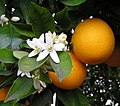Citrus





Citrus is a genus of flowering trees and shrubs in the rue family, Rutaceae. Plants in the genus produce citrus fruits, including important crops such as oranges, lemons, grapefruits, pomelos, and limes. The genus is native to South Asia, East Asia, Southeast Asia, Melanesia, and Australia.
Description[edit]
Citrus plants are typically evergreen, with glossy, ovate leaves and fragrant white flowers. The fruit is a type of berry known as a hesperidium, characterized by a leathery rind and a juicy interior divided into segments.
History[edit]
The cultivation of citrus fruits has a long history, dating back to ancient times. The earliest references to citrus fruits are found in Chinese literature from around 4,000 years ago. Citrus fruits were also known in Ancient Greece and Rome.
Species[edit]
The genus Citrus includes several species, some of the most notable being:
- Citrus sinensis - Sweet Orange
- Citrus limon - Lemon
- Citrus paradisi - Grapefruit
- Citrus maxima - Pomelo
- Citrus aurantiifolia - Key Lime
Cultivation[edit]
Citrus plants are cultivated in tropical and subtropical climates. They require well-drained soil and are sensitive to frost. The trees are typically propagated through grafting to ensure the quality and consistency of the fruit.
Uses[edit]
Citrus fruits are widely consumed fresh, juiced, or used as flavoring agents in cooking and baking. They are rich in vitamin C, fiber, and various phytochemicals.
Health Benefits[edit]
Citrus fruits are known for their health benefits, including boosting the immune system, improving skin health, and reducing the risk of chronic diseases such as heart disease and cancer.
Pests and Diseases[edit]
Citrus plants are susceptible to various pests and diseases, including:
See Also[edit]
References[edit]
<references group="" responsive="1"></references>
External Links[edit]
-
Citrus
Ad. Transform your life with W8MD's Budget GLP-1 injections from $75


W8MD offers a medical weight loss program to lose weight in Philadelphia. Our physician-supervised medical weight loss provides:
- Weight loss injections in NYC (generic and brand names):
- Zepbound / Mounjaro, Wegovy / Ozempic, Saxenda
- Most insurances accepted or discounted self-pay rates. We will obtain insurance prior authorizations if needed.
- Generic GLP1 weight loss injections from $75 for the starting dose.
- Also offer prescription weight loss medications including Phentermine, Qsymia, Diethylpropion, Contrave etc.
NYC weight loss doctor appointmentsNYC weight loss doctor appointments
Start your NYC weight loss journey today at our NYC medical weight loss and Philadelphia medical weight loss clinics.
- Call 718-946-5500 to lose weight in NYC or for medical weight loss in Philadelphia 215-676-2334.
- Tags:NYC medical weight loss, Philadelphia lose weight Zepbound NYC, Budget GLP1 weight loss injections, Wegovy Philadelphia, Wegovy NYC, Philadelphia medical weight loss, Brookly weight loss and Wegovy NYC
|
WikiMD's Wellness Encyclopedia |
| Let Food Be Thy Medicine Medicine Thy Food - Hippocrates |
Medical Disclaimer: WikiMD is not a substitute for professional medical advice. The information on WikiMD is provided as an information resource only, may be incorrect, outdated or misleading, and is not to be used or relied on for any diagnostic or treatment purposes. Please consult your health care provider before making any healthcare decisions or for guidance about a specific medical condition. WikiMD expressly disclaims responsibility, and shall have no liability, for any damages, loss, injury, or liability whatsoever suffered as a result of your reliance on the information contained in this site. By visiting this site you agree to the foregoing terms and conditions, which may from time to time be changed or supplemented by WikiMD. If you do not agree to the foregoing terms and conditions, you should not enter or use this site. See full disclaimer.
Credits:Most images are courtesy of Wikimedia commons, and templates, categories Wikipedia, licensed under CC BY SA or similar.
Translate this page: - East Asian
中文,
日本,
한국어,
South Asian
हिन्दी,
தமிழ்,
తెలుగు,
Urdu,
ಕನ್ನಡ,
Southeast Asian
Indonesian,
Vietnamese,
Thai,
မြန်မာဘာသာ,
বাংলা
European
español,
Deutsch,
français,
Greek,
português do Brasil,
polski,
română,
русский,
Nederlands,
norsk,
svenska,
suomi,
Italian
Middle Eastern & African
عربى,
Turkish,
Persian,
Hebrew,
Afrikaans,
isiZulu,
Kiswahili,
Other
Bulgarian,
Hungarian,
Czech,
Swedish,
മലയാളം,
मराठी,
ਪੰਜਾਬੀ,
ગુજરાતી,
Portuguese,
Ukrainian

